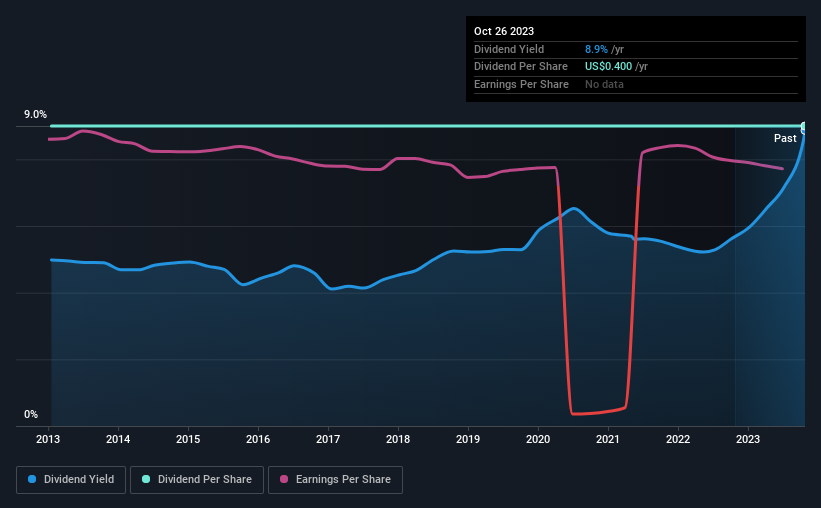Here's Why We're Wary Of Buying Kentucky First Federal Bancorp's (NASDAQ:KFFB) For Its Upcoming Dividend
Some investors rely on dividends for growing their wealth, and if you're one of those dividend sleuths, you might be intrigued to know that Kentucky First Federal Bancorp (NASDAQ:KFFB) is about to go ex-dividend in just 3 days. The ex-dividend date is usually set to be one business day before the record date which is the cut-off date on which you must be present on the company's books as a shareholder in order to receive the dividend. The ex-dividend date is of consequence because whenever a stock is bought or sold, the trade takes at least two business day to settle. Accordingly, Kentucky First Federal Bancorp investors that purchase the stock on or after the 30th of October will not receive the dividend, which will be paid on the 20th of November.
The company's next dividend payment will be US$0.10 per share. Last year, in total, the company distributed US$0.40 to shareholders. Based on the last year's worth of payments, Kentucky First Federal Bancorp stock has a trailing yield of around 8.9% on the current share price of $4.51. Dividends are a major contributor to investment returns for long term holders, but only if the dividend continues to be paid. So we need to investigate whether Kentucky First Federal Bancorp can afford its dividend, and if the dividend could grow.
See our latest analysis for Kentucky First Federal Bancorp
If a company pays out more in dividends than it earned, then the dividend might become unsustainable - hardly an ideal situation. Last year, Kentucky First Federal Bancorp paid out 349% of its profit to shareholders in the form of dividends. This is not sustainable behaviour and requires a closer look on behalf of the purchaser.
Generally, the higher a company's payout ratio, the more the dividend is at risk of being reduced.
Click here to see how much of its profit Kentucky First Federal Bancorp paid out over the last 12 months.
Have Earnings And Dividends Been Growing?
Companies with falling earnings are riskier for dividend shareholders. If business enters a downturn and the dividend is cut, the company could see its value fall precipitously. Kentucky First Federal Bancorp's earnings per share have fallen at approximately 6.1% a year over the previous five years. When earnings per share fall, the maximum amount of dividends that can be paid also falls.
Another key way to measure a company's dividend prospects is by measuring its historical rate of dividend growth. Kentucky First Federal Bancorp's dividend payments are effectively flat on where they were 10 years ago. When earnings are declining yet the dividends are flat, typically the company is either paying out a higher portion of its earnings, or paying out of cash or debt on the balance sheet, neither of which is ideal.
The Bottom Line
From a dividend perspective, should investors buy or avoid Kentucky First Federal Bancorp? Earnings per share are in decline and Kentucky First Federal Bancorp is paying out what we feel is an uncomfortably high percentage of its profit as dividends. It's not that we hate the business, but we feel that these characeristics are not desirable for investors seeking a reliable dividend stock to own for the long term. Kentucky First Federal Bancorp doesn't appear to have a lot going for it, and we're not inclined to take a risk on owning it for the dividend.
With that being said, if you're still considering Kentucky First Federal Bancorp as an investment, you'll find it beneficial to know what risks this stock is facing. Every company has risks, and we've spotted 3 warning signs for Kentucky First Federal Bancorp you should know about.
If you're in the market for strong dividend payers, we recommend checking our selection of top dividend stocks.
Have feedback on this article? Concerned about the content? Get in touch with us directly. Alternatively, email editorial-team (at) simplywallst.com.
This article by Simply Wall St is general in nature. We provide commentary based on historical data and analyst forecasts only using an unbiased methodology and our articles are not intended to be financial advice. It does not constitute a recommendation to buy or sell any stock, and does not take account of your objectives, or your financial situation. We aim to bring you long-term focused analysis driven by fundamental data. Note that our analysis may not factor in the latest price-sensitive company announcements or qualitative material. Simply Wall St has no position in any stocks mentioned.

